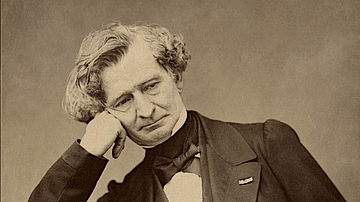Search
Search Results

Definition
Medieval Tournament
The medieval tournament was a forum for European knights where they could practise and show off their military skills in activities such as jousting or the mêlée, indulge in a bit of pageantry, display their chivalrous qualities and win both...

Definition
Euripides
Euripides (c. 484-407 BCE) was one of the greatest authors of Greek tragedy. In 5th century BCE Athens his classic works such as Medeia cemented his reputation for clever dialogues, fine choral lyrics and a gritty realism in both his text...

Definition
William Dampier
William Dampier (1651-1715) was an English explorer, navigator, and naturalist, who was the first person to circumnavigate the world three times. He was also among the first Englishmen to step foot on Australian soil when he sailed into King...

Definition
John Paul Jones
John Paul Jones (1747-1792) was a Scottish-born sailor who served in the Continental Navy during the American Revolutionary War (1775-1783). His raid on the English port town of Whitehaven in 1778 and his victory over the HMS Serapis the...

Definition
Sif
Sif is a fertility goddess in Norse mythology, wife of the thunder god Thor, best known for the story in which the trickster god Loki cuts her hair as a prank and is forced to replace it with a magical headpiece, leading to the creation of...

Definition
Oedipus the King
Oedipus the King (429-420 BCE), also known as Oedipus Rex or Oedipus Tyrannos ('Tyrannos' signifies that the throne was not gained through an inheritance) is the most famous surviving play written by the 5th-century BCE poet and dramatist...

Definition
Chretien de Troyes
Chretien de Troyes (l. c. 1130-1190 CE) was the greatest romantic poet of his era, regarded today as the Father of Arthurian Romance (along with Geoffrey of Monmouth) and also Father of the Novel owing to his narrative form. He was most likely...

Definition
Hector Berlioz
Hector Berlioz (1803-1869) was the leading French composer of Romantic music, best known for his innovative Symphonie fantastique and use of large-scale orchestras and choruses in works like The Trojans opera. Berlioz's innovative style brought...

Definition
Antonín Dvořák
Antonín Dvořák (1841-1904) was a Czech composer best known for his symphonies, symphonic poems, operas, and chamber music. Dvořák's best-loved works include his 9th Symphony (From The New World), the American quartet, and his Slavonic Dances...

Definition
Helen (Play)
Helen is a Greek tragedy by Euripides (c. 484-407 BCE). It is usually thought to have first been performed at the Great Dionysia of 412 BCE and was part of the trilogy that included Euripides' lost Andromeda. Helen recounts an unusual version...